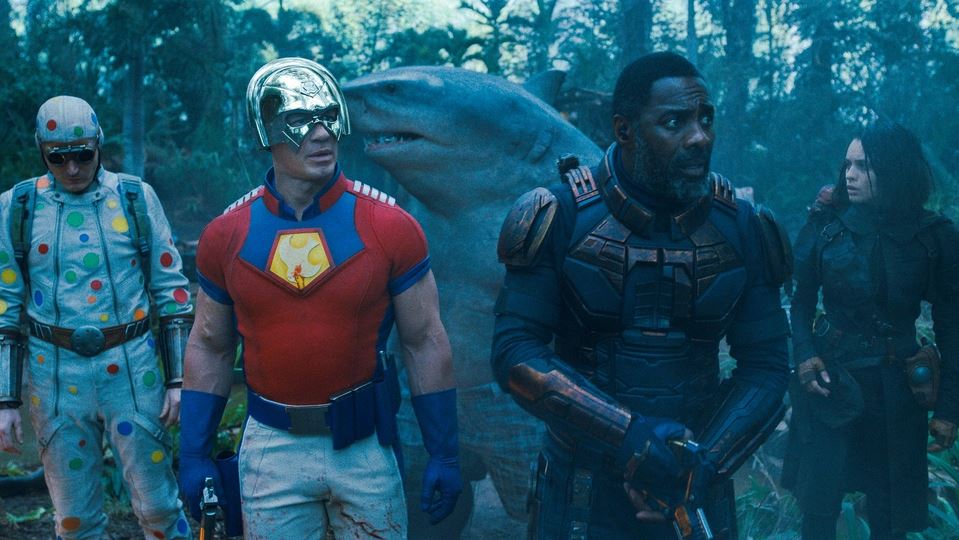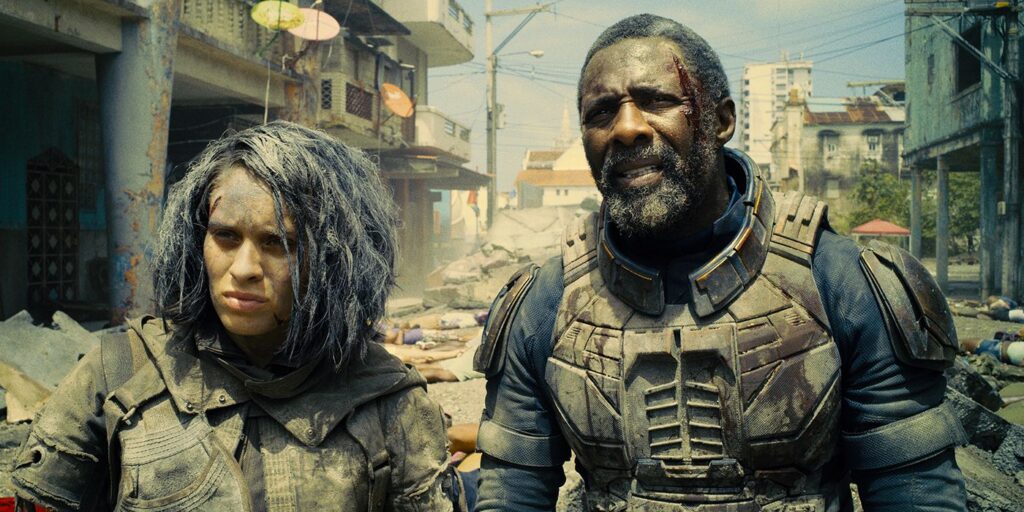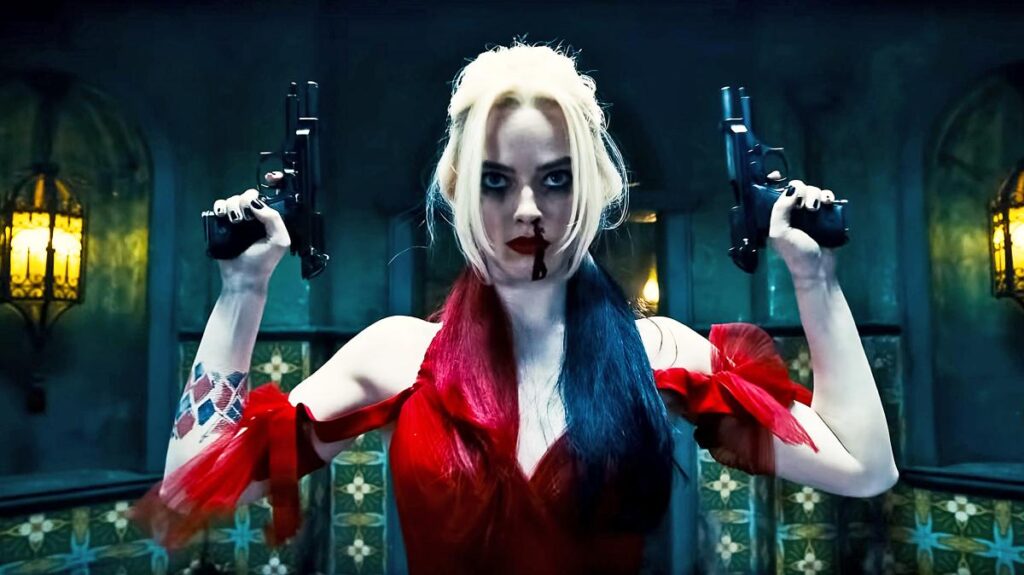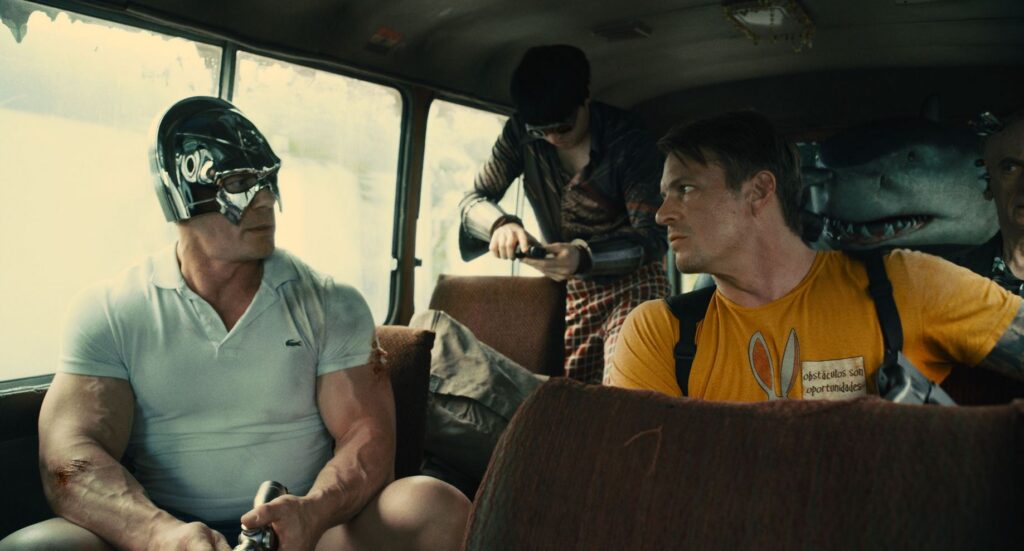
What makes a good superhero movie? Given the routine onslaught of costumed crusaders at the multiplex, the question seems pertinent. It also seems irrelevant, as the discourse surrounding the genre’s overall merits—a perpetual battle between triumphant, weirdly hostile fans (comics rule, deal with it!) and bitter, exasperated detractors (get a life, nerds!)—tends to feel preprogrammed, regardless of the particular installment at issue. But even if all superhero flicks are the same, some are less the same than others. And The Suicide Squad, the entertaining and ridiculous sequel/reboot/standalone/whatever from James Gunn, possesses an unusually keen understanding of how such films should work. Funny, colorful, and only occasionally tedious, it keys in on two fundamental truths: Superheroes are comedians, and superheroes are psychopaths.
It’s easy to miss that second one, as popular culture tends to connote masked vigilantism with virtuous qualities: responsibility, integrity, sacrifice. (They’re called superheroes, after all.) The job’s less savory aspects—the constant deception, the maniacal narcissism, the extralegal beatdowns—tend to be secondary considerations, or obstacles of self-doubt that the protagonist must hurdle en route to saving the world and getting the girl. One nice thing about The Suicide Squad is that it scarcely bothers to imbue its demented warriors with any righteousness or internal conflict. Instead, their motivations are squarely selfish; most of them are convicts, and they agree to participate in the obligatory searching and rescuing in exchange for years being shaved off their prison sentences. And of course, if any of them misbehaves or goes off mission, then their no-nonsense director, Amanda Waller (Viola Davis, all business), will remotely detonate the explosive charge embedded in their skull.
If that plot point sounds familiar, it isn’t just because you’ve seen Escape from New York; you may also remember it from Suicide Squad, David Ayer’s article-free, misbegotten adventure from 2016. Then again, you may not remember Suicide Squad; I barely do. (I believe Jared Leto had green hair, and Cara Delevingne whispered a lot.) Technically, the corporate overlords at Warner Bros. and DC Comics have branded Gunn’s movie a “standalone sequel”, a hilariously contradictory term that shouldn’t overshadow the new film’s streak of relative independence. Yes, a few actors reprise their old roles, and surely a legitimate follow-up is in the works (there’s a mid-credits scene and a post-credits scene!), but for the most part, The Suicide Squad is blissfully unconcerned with cinematic-universe continuity. That’s just one of many blockbuster norms that Gunn gleefully disregards; also jettisoned are propriety, sanitized violence, and the sweaty need to appeal to all four quadrants.

This isn’t to say that the movie is especially revolutionary. It still follows the basic blueprint that Marvel designed years ago, and that DC has been scrambling to emulate ever since, with elaborate sequences of computer-generated mayhem punctuating quippy scenes of bonding and bickering. Which brings us back to that first truth. As he proved in his two Guardians of the Galaxy pictures, Gunn is a gifted humorist and a somewhat less talented visual artist, which makes him the perfect steward for modern superhero cinema, a genre where numbing and weightless action is subservient to sharp and pithy banter. The Suicide Squad is hardly serene—there are plenty of fights, flights, and explosions—but it is, first and foremost, a comedy.
And a pretty funny one. With its barrage of vulgar jokes and on-the-nose needle drops, the movie adopts a resolutely silly tone that could be obnoxious in the wrong hands, but its persistent flippancy feels more genuine than, say, the smirking insouciance of the Deadpool films. Gunn’s dialogue is both childish and profane, a fitting mixture for a movie about egotistical manbabies who are more interested in measuring their dicks than doing their jobs. The main rivalry is between Bloodsport (Idris Elba), a weapons expert and the troop’s designated leader, and Peacemaker (John Cena, far more comfortable here than he was in F9), a preening psychopath (see!) who takes might-is-right jingoism to new levels. “I cherish peace with all my heart; I don’t care how many men, women, and children I need to kill to get it,” Peacemaker growls with absolute earnestness. The scene where these two hulking killing machines attempt to show one another up while ruthlessly dispatching a band of South American natives is a spry and playful sequence, with a brilliant button that dispels the whiff of racism lingering in the air and reshapes it as good old-fashioned American stupidity.
There are quite a few other flamboyant personalities on hand, though not as many as you might expect; while Gunn has assembled a large and capable cast, he has the gall to slice it in half early on, following a bloodbath on a beach that establishes both the movie’s extravagant gore and its appetite for slaughter. (Hey, isn’t that Pete Davidso—welp, never mind.) Aside from Bloodsport and Peacemaker, the central survivors include Ratcatcher 2 (Daniela Melchior), a thief who can commune with rodents; Polka-Dot Man (David Dastmalchian), an admitted lunatic with mommy issues whose powers are surprisingly unsurprising; Colonel Flag (Joel Kinnaman), the lone traditional soldier in the bunch; and King Shark, a deadly man-fish hybrid who is perhaps a step behind the others in terms of intelligence. King Shark, who was played on set by Steve Agee but who speaks in the slow-witted rumble of Sylvester Stallone, functions as a cheerful monosyllabic counterpoint to the rest of the crew’s nonstop antagonistic yammering; he earns laughs simply by breaking into a fraught planning session and announcing, “Bird!”

It’s a fun crowd, but the heart of The Suicide Squad (italicized and otherwise) is Harley Quinn, the crazed psychiatrist played once again by Margot Robbie with a remarkable combination of impishness and sincerity. With her deranged smile and trademark multicolored pigtails, Harley is a ticking bomb, prone to spasmodic displays of rage. Yet she’s also oddly sweet, and in a scene where she calmly murders a would-be boyfriend/supervillain, Robbie peels back the coat of nihilism and reveals something more desperate and tender. That in no way mitigates her lethality, which she flaunts soon after in the movie’s most memorable sequence, when Harley escapes her manacles, rampages down a hallway in a flowing red dress, and lays waste to her captors with extreme prejudice.
Gunn executes that set piece with a welcome degree of panache, at one point making the cartoonish violence literal. On the whole, the action in The Suicide Squad is less dynamic than the fluid kineticism that Cathy Yan brought to Birds of Prey (which also features a stellar Robbie performance as Harley), but it’s a minor flaw, and not just because the film’s carnage is passable; it’s because there isn’t all that much of it. That may sound strange for a movie that’s so committed to bloodletting, but Gunn isn’t all that interested in mounting rock-’em sock-’em blowouts. He’s more invested in creating distinctive moments, like a brawl that initially plays out through the reflection of Peacemaker’s helmet, or the archetypal wide shot (here delivered twice) of a platoon striding toward the camera in slow motion. Even the gonzo climax, which is typically where superhero films toil in a swamp of gluttonous effects and edits, possesses a certain character; it’s so absurd (“We’ve got a freaking kaiju up in this shit!”) that it scans as a parody of the usual mindless, CGI-infested torpor, and it’s topped off with a glorious shot that finds Harley combining two Olympic events (the javelin throw and the long jump) into a single display of graceful, berserk athleticism.

The Suicide Squad is such giddy, boisterous entertainment, it manages to camouflage its own problems, which are plentiful. Despite Davis’ steel and the appealing presence of Peter Capaldi as a rogue scientist with random bits of metal jutting out of his head, the generic warlord villains are disappointingly flat; that’s arguably excusable, given that the heroes themselves do double duty as heavies, but it’s still odd that Gunn passed on the chance to craft a truly nasty big bad. (The enemy who does emerge for the final showdown is certainly eccentric, but not exactly personable.) Some might contend that the actual villain of the piece is American imperialism (the events take place in the fictional island nation of Corto Maltese), but the allegory is too clumsy to be meaningful. Gunn also goes soft a time or two; a subplot involving Bloodsport’s delinquent daughter (Storm Reid) is unpersuasive, while Ratcatcher 2 surely didn’t require two flashbacks to flesh out her character.
Still, the film’s structural and emotional failings seem, if not immaterial, then at least secondary next to its sheer force of personality—whether it’s Gunn’s clever use of on-screen text or the way he divulges a piece of Ratcatcher 2’s past in the misted glass of a car window. (He also has the good sense to supply a scene where Cena is dressed only in his undies.) “Did anyone check if the weasel can swim?” Colonel Flag muses as the squad’s varmint member plummets to a watery grave. That’s just the first amusing death among many in The Suicide Squad, an imperfect movie that’s nonetheless smart and savvy enough to draft a new template for the genre. The evidence is plain: If superhero cinema is to succeed going forward, the first thing it needs to do is blow itself up.
Grade: B
Jeremy Beck is the editor-in-chief of MovieManifesto. He watches more movies and television than he probably should.
